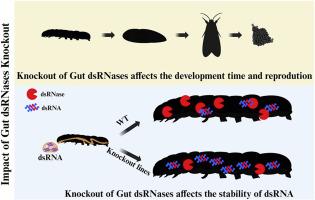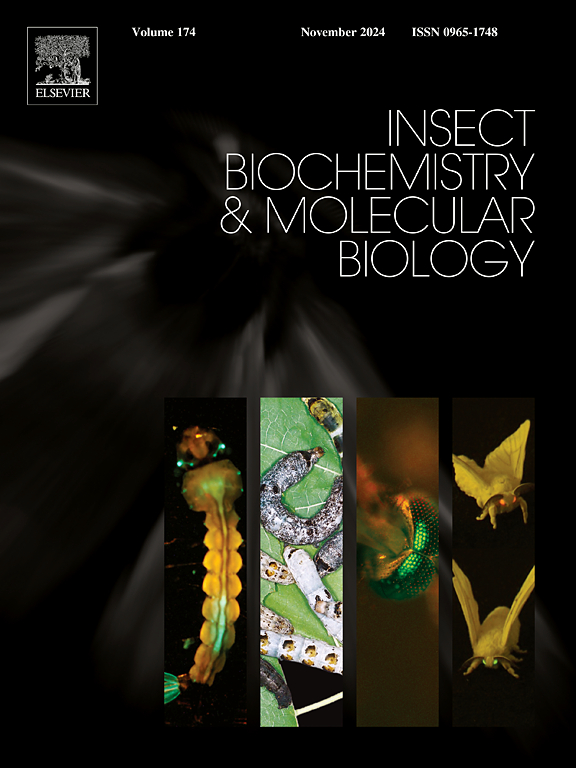甜菜夜蛾肠道 dsRNase 的鉴定和功能分析
IF 3.2
2区 农林科学
Q2 BIOCHEMISTRY & MOLECULAR BIOLOGY
引用次数: 0
摘要
基于 RNA 干扰(RNAi)的产品有可能极大地促进害虫控制。然而,不同昆虫纲的 RNAi 效率差异很大,尤其是鳞翅目昆虫的 RNAi 效率通常很低。影响 RNAi 效率的一个关键因素是消化道中存在双链核糖核酸酶(dsRNase),它能在肠道细胞吸收之前降解 dsRNA。本研究在甜菜夜蛾(Spdoptera exigua)体内发现了四种dsRNase,其中两种是高表达的肠道dsRNase,即SedsRNase1和SedsRNase2。为了评估它们对通过口服途径降解dsRNA活性的影响,研究人员采用了基于CRISPR/Cas9的基因编辑技术来敲除这些肠道dsRN酶。结果表明,所有突变株,包括SeKO1(敲除SedsRNase1)、SeKO2(敲除SedsRNase2)和SeKO1KO2(敲除SedsRNase1和SedsRNase2),dsRNA降解活性都显著降低,尤其是SeKO1KO2突变株,其肠道和全身降解活性最弱。此外,我们还注意到,肠道 SedsRNases 的缺乏导致 S. exigua 的发育期略有延长,繁殖能力下降。总之,这些发现加深了我们对肠道 SedsRNNases 及其如何影响甜菜夜蛾生物学的了解,并有助于探索基于 dsRNA 的害虫控制方法。本文章由计算机程序翻译,如有差异,请以英文原文为准。

Identification and functional analysis of gut dsRNases in the beet armyworm Spodoptera exigua
RNA interference (RNAi)-based products have the potential to significantly contribute to insect pest control. However, RNAi efficiency varies widely among different insect orders, particularly in Lepidoptera, where it is often low. One key factor affecting RNAi efficiency is the presence of double-stranded ribonuclease (dsRNase) in the digestive tract, which can degrade dsRNA prior to uptake by gut cells. In this study, four dsRNases were identified in the beet armyworm, Spdoptera exigua, of which two were highly expressed gut dsRNases, SedsRNase1 and SedsRNase2. To assess their effect on dsRNA degradation activity via the oral route, CRISPR/Cas9-based gene editing was employed to knock out these gut dsRNases. The results indicate that all mutant strains, including SeKO1 (knockout SedsRNase1), SeKO2 (knockout SedsRNase2), and SeKO1KO2 (knockout SedsRNase1 and SedsRNase2), showed significantly decreased dsRNA degradation activity, particularly in the SeKO1KO2 mutant strain, where the weakest degradation occurred in both the gut and whole body. Additionally, we noticed that the lack of gut SedsRNases led to a slight extended developmental period and reduced reproductive capacity in S. exigua. Collectively, these findings deepen our understanding of gut SedsRNases and how they can impact the biology of the beet armyworm and can support the exploration dsRNA-based approaches for pest control.
求助全文
通过发布文献求助,成功后即可免费获取论文全文。
去求助
来源期刊
CiteScore
7.40
自引率
5.30%
发文量
105
审稿时长
40 days
期刊介绍:
This international journal publishes original contributions and mini-reviews in the fields of insect biochemistry and insect molecular biology. Main areas of interest are neurochemistry, hormone and pheromone biochemistry, enzymes and metabolism, hormone action and gene regulation, gene characterization and structure, pharmacology, immunology and cell and tissue culture. Papers on the biochemistry and molecular biology of other groups of arthropods are published if of general interest to the readership. Technique papers will be considered for publication if they significantly advance the field of insect biochemistry and molecular biology in the opinion of the Editors and Editorial Board.

 求助内容:
求助内容: 应助结果提醒方式:
应助结果提醒方式:


